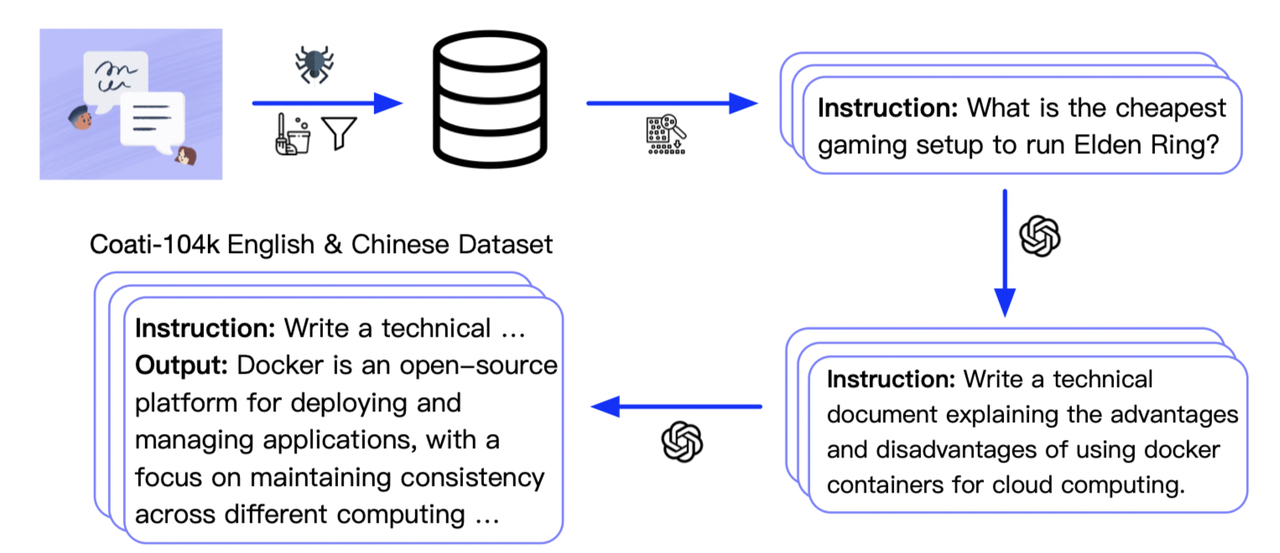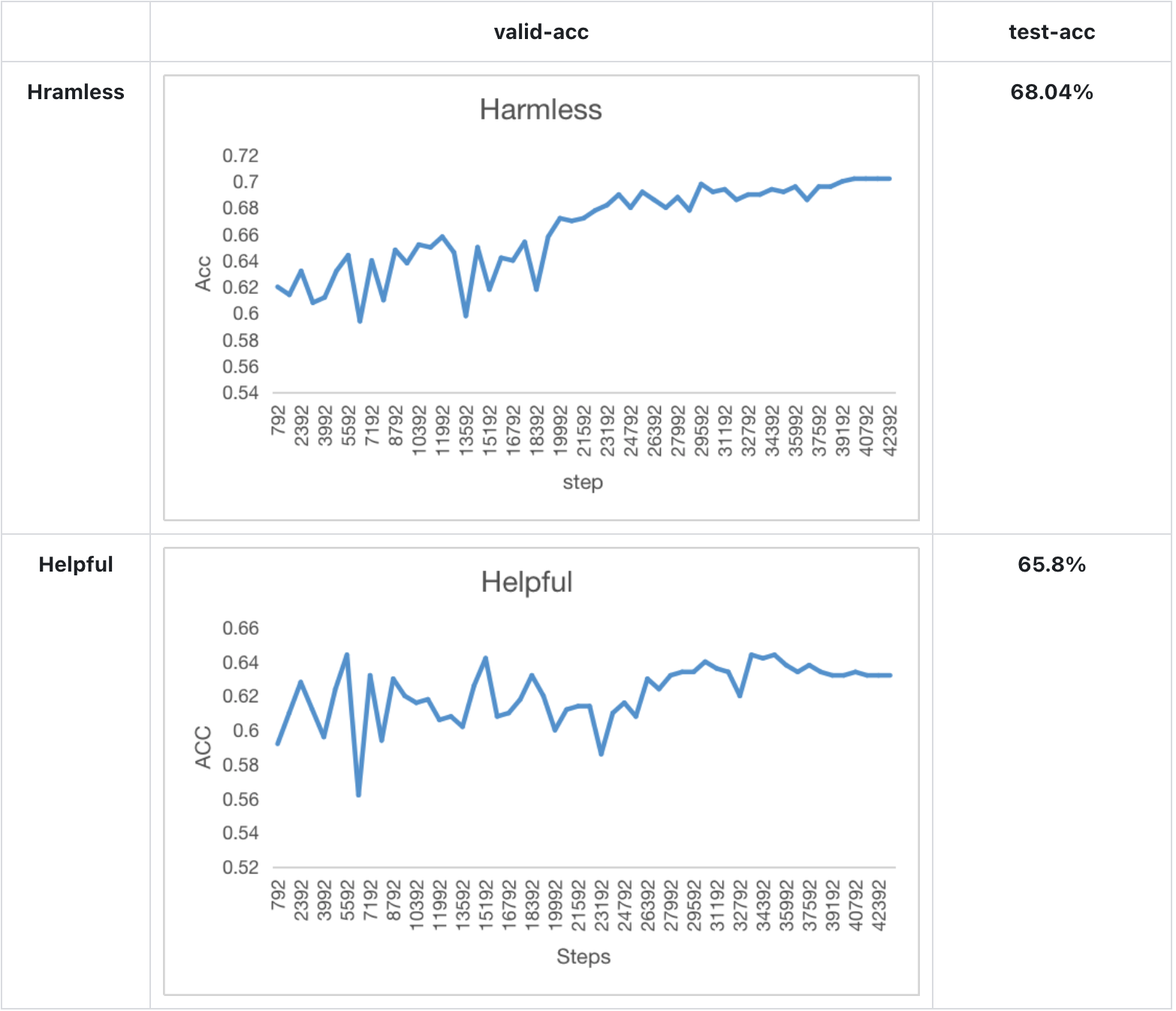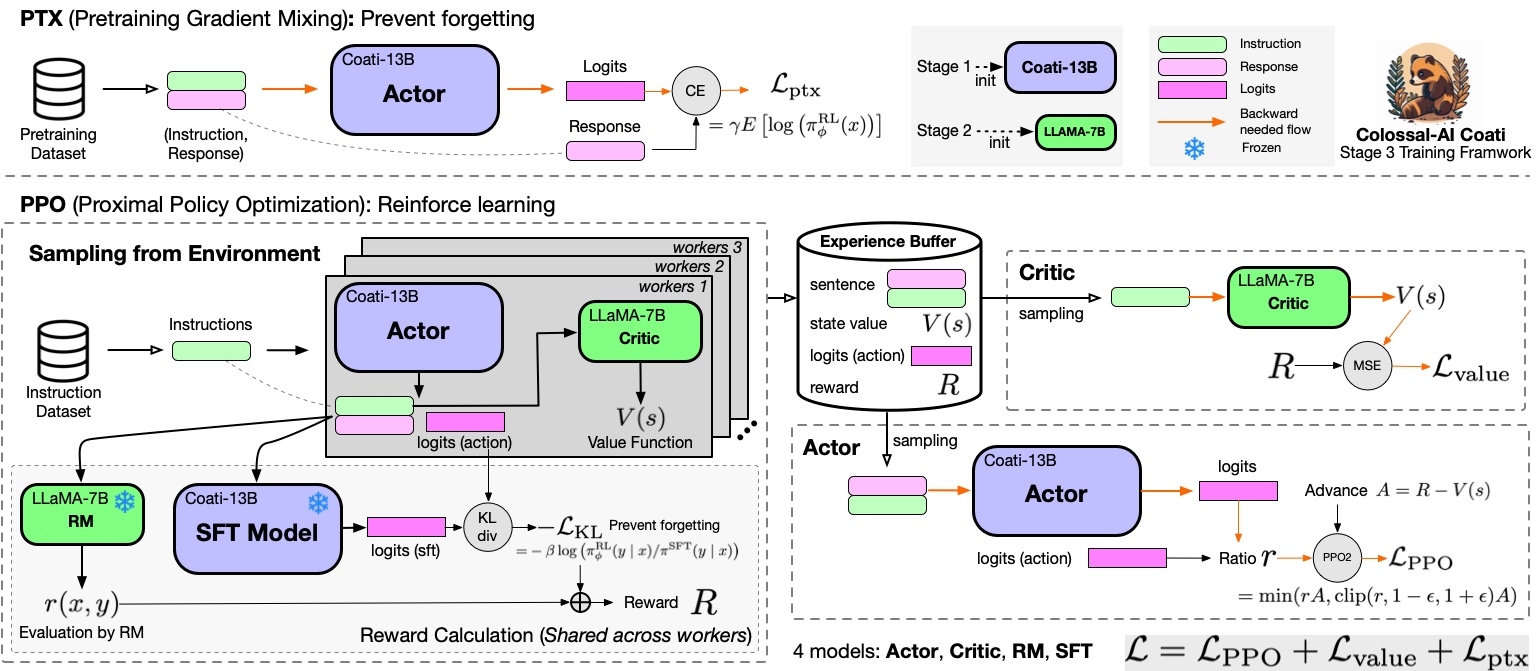* Detached ppo (#9) * run the base * working on dist ppo * sync * detached trainer * update detached trainer. no maker update function * facing init problem * 1 maker 1 trainer detached run. but no model update * facing cuda problem * fix save functions * verified maker update * nothing * add ignore * analyize loss issue * remove some debug codes * facing 2m1t stuck issue * 2m1t verified * do not use torchrun * working on 2m2t * working on 2m2t * initialize strategy in ray actor env * facing actor's init order issue * facing ddp model update issue (need unwarp ddp) * unwrap ddp actor * checking 1m2t stuck problem * nothing * set timeout for trainer choosing. It solves the stuck problem! * delete some debug output * rename to sync with upstream * rename to sync with upstream * coati rename * nothing * I am going to detach the replaybuffer from trainer and make it a Ray Actor. Two benefits: 1. support TP trainer. 2. asynchronized buffer operations * experience_maker_holder performs target-revolving _send_experience() instead of length comparison. * move code to ray subfolder * working on pipeline inference * apply comments * working on pipeline strategy. in progress. * remove pipeline code. clean this branch * update remote parameters by state_dict. no test * nothing * state_dict sharding transfer * merge debug branch * gemini _unwrap_model fix * simplify code * simplify code & fix LoRALinear AttributeError * critic unwrapped state_dict --------- Co-authored-by: csric <richcsr256@gmail.com> * [chat] add perfomance evaluator and fix bugs (#10) * [chat] add performance evaluator for ray * [chat] refactor debug arg * [chat] support hf config * [chat] fix generation * [chat] add 1mmt dummy example * [chat] fix gemini ckpt * split experience to send (#11) Co-authored-by: csric <richcsr256@gmail.com> * [chat] refactor trainer and maker (#12) * [chat] refactor experience maker holder * [chat] refactor model init * [chat] refactor trainer args * [chat] refactor model init * [chat] refactor trainer * [chat] refactor experience sending logic and training loop args (#13) * [chat] refactor experience send logic * [chat] refactor trainer * [chat] refactor trainer * [chat] refactor experience maker * [chat] refactor pbar * [chat] refactor example folder (#14) * [chat] support quant (#15) * [chat] add quant * [chat] add quant example * prompt example (#16) * prompt example * prompt load csv data * remove legacy try --------- Co-authored-by: csric <richcsr256@gmail.com> * [chat] add mmmt dummy example and refactor experience sending (#17) * [chat] add mmmt dummy example * [chat] refactor naive strategy * [chat] fix struck problem * [chat] fix naive strategy * [chat] optimize experience maker sending logic * [chat] refactor sending assignment * [chat] refactor performance evaluator (#18) * Prompt Example & requires_grad state_dict & sharding state_dict (#19) * prompt example * prompt load csv data * remove legacy try * maker models require_grad set to False * working on zero redundancy update * mmmt_prompt example; naive strategy requires_grad state_dict & sharding; maker model requires_no_grad. * remove legacy examples * remove legacy examples * remove replay buffer tp state. bad design --------- Co-authored-by: csric <richcsr256@gmail.com> * state_dict sending adapts to new unwrap function (#20) * prompt example * prompt load csv data * remove legacy try * maker models require_grad set to False * working on zero redundancy update * mmmt_prompt example; naive strategy requires_grad state_dict & sharding; maker model requires_no_grad. * remove legacy examples * remove legacy examples * remove replay buffer tp state. bad design * opt benchmark * better script * nothing * [chat] strategy refactor unwrap model * [chat] strategy refactor save model * [chat] add docstr * [chat] refactor trainer save model * [chat] fix strategy typing * [chat] refactor trainer save model * [chat] update readme * [chat] fix unit test * working on lora reconstruction * state_dict sending adapts to new unwrap function * remove comments --------- Co-authored-by: csric <richcsr256@gmail.com> Co-authored-by: ver217 <lhx0217@gmail.com> * [chat-ray] add readme (#21) * add readme * transparent graph * add note background --------- Co-authored-by: csric <richcsr256@gmail.com> * [chat] get images from url (#22) * Refactor/chat ray (#23) * [chat] lora add todo * [chat] remove unused pipeline strategy * [chat] refactor example structure * [chat] setup ci for ray * [chat-ray] Support LoRA trainer. LoRA weights reconstruction. (#24) * lora support prototype * lora support * 1mmt lora & remove useless code --------- Co-authored-by: csric <richcsr256@gmail.com> * [chat] fix test ci for ray * [chat] fix test ci requirements for ray * [chat] fix ray runtime env * [chat] fix ray runtime env * [chat] fix example ci docker args * [chat] add debug info in trainer * [chat] add nccl debug info * [chat] skip ray test * [doc] fix typo --------- Co-authored-by: csric <59389055+CsRic@users.noreply.github.com> Co-authored-by: csric <richcsr256@gmail.com> |
||
|---|---|---|
| .. | ||
| community | ||
| ray | ||
| README.md | ||
| generate_prompt_dataset.py | ||
| inference.py | ||
| requirements.txt | ||
| test_ci.sh | ||
| train_prompts.py | ||
| train_prompts.sh | ||
| train_reward_model.py | ||
| train_rm.sh | ||
| train_sft.py | ||
| train_sft.sh | ||
README.md
Examples
Table of Contents
- Examples
Install requirements
pip install -r requirements.txt
Supervised datasets collection
We collected 104K bilingual dataset of Chinese and English, and you can find the datasets in this repo InstructionWild.
The following pic shows how we collected the data.

Stage1 - Supervised instructs tuning
Stage1 is supervised instructs fine-tuning, which uses the datasets mentioned earlier to fine-tune the model. [Stage1 tutorial video]
You can run the examples/train_sft.sh to start a supervised instructs fine-tuning.
You can also use the following cmd to start a supervised instructs fine-tuning with your own settings.
torchrun --standalone --nproc_per_node=4 train_sft.py \
--pretrain "/path/to/LLaMa-7B/" \
--model 'llama' \
--strategy colossalai_zero2 \
--log_interval 10 \
--save_path /path/to/Coati-7B \
--dataset /path/to/data.json \
--batch_size 4 \
--accumulation_steps 8 \
--lr 2e-5 \
--max_datasets_size 512 \
--max_epochs 1 \
--grad_checkpoint
Arg List
- --strategy: the strategy using for training, choices=['naive', 'ddp', 'colossalai_gemini', 'colossalai_zero2'], default='colossalai_zero2'
- --model: model type, choices=['gpt2', 'bloom', 'opt', 'llama'], default='bloom'
- --pretrain: pretrain model, type=str, default=None
- --max_datasets_size: the max size of dataset, type=int, default=None
- --save_path: path to save the model, type=str, default='output'
- --need_optim_ckpt: whether to save optim ckpt, type=bool, default=False
- --max_epochs: max epochs for training, type=int, default=3
- --batch_size: batch size while training, type=int, default=4
- --lora_rank: low-rank adaptation matrices rank, type=int, default=0
- --log_interval: how many steps to log, type=int, default=100
- --grad_checkpoint: enable gradient checkpointing, type=bool, default=False
Stage2 - Training reward model
We train a reward model in stage 2, which obtains corresponding scores by manually ranking different outputs for the same prompt and supervises the training of the reward model. [Stage2 tutorial video]
You can run the examples/train_rm.sh to start a reward model training.
You can also use the following cmd to start training a reward model.
torchrun --standalone --nproc_per_node=4 train_reward_model.py \
--pretrain "/path/to/LLaMa-7B/" \
--model 'llama' \
--strategy colossalai_zero2 \
--loss_fn 'log_exp'\
--save_path 'rmstatic.pt' \
Features and tricks in RM training
- We support Anthropic/hh-rlhfandrm-static datasets.
- We support 2 kinds of loss_function named 'log_sig'(used by OpenAI) and 'log_exp'(used by Anthropic).
- We change the loss to valid_acc and pair_dist to monitor progress during training.
- We add special token to the end of the sequence to get better result.
- We use cosine-reducing lr-scheduler for RM training.
- We set value_head as 1 liner layer and initialize the weight of value_head using N(0,1/(d_model + 1)) distribution.
- We train a Bloom-560m reward model for 1 epoch and find the test acc of the model achieve the performance mentions in Anthropics paper.
Experiment result
Model performance in Anthropics paper:


Arg List
- --strategy: the strategy using for training, choices=['naive', 'ddp', 'colossalai_gemini', 'colossalai_zero2'], default='colossalai_zero2'
- --model: model type, choices=['gpt2', 'bloom', 'opt', 'llama'], default='bloom'
- --pretrain: pretrain model, type=str, default=None
- --model_path: the path of rm model(if continue to train), type=str, default=None
- --save_path: path to save the model, type=str, default='output'
- --need_optim_ckpt: whether to save optim ckpt, type=bool, default=False
- --max_epochs: max epochs for training, type=int, default=3
- --dataset: dataset name, type=str, choices=['Anthropic/hh-rlhf', 'Dahoas/rm-static']
- --subset: subset of the dataset, type=str, default=None
- --batch_size: batch size while training, type=int, default=4
- --lora_rank: low-rank adaptation matrices rank, type=int, default=0
- --loss_func: which kind of loss function, choices=['log_sig', 'log_exp']
- --max_len: max sentence length for generation, type=int, default=512
- --test: whether is only testing, if it's true, the dataset will be small
Stage3 - Training model using prompts with RL
Stage3 uses reinforcement learning algorithm, which is the most complex part of the training process, as shown below:

You can run the examples/train_prompts.sh to start PPO training.
You can also use the cmd following to start PPO training.
[Stage3 tutorial video]
torchrun --standalone --nproc_per_node=4 train_prompts.py \
--pretrain "/path/to/LLaMa-7B/" \
--model 'llama' \
--strategy colossalai_zero2 \
--prompt_dataset /path/to/your/prompt_dataset \
--pretrain_dataset /path/to/your/pretrain_dataset \
--rm_pretrain /your/pretrain/rm/definition \
--rm_path /your/rm/model/path
Prompt dataset: the instruction dataset mentioned in the above figure which includes the instructions, e.g. you can use the script which samples instinwild_en.json or instinwild_ch.json in InstructionWild to generate the prompt dataset.
Pretrain dataset: the pretrain dataset including the instruction and corresponding response, e.g. you can use the InstructWild Data in stage 1 supervised instructs tuning.
Arg List
- --strategy: the strategy using for training, choices=['naive', 'ddp', 'colossalai_gemini', 'colossalai_zero2'], default='colossalai_zero2'
- --model: model type of actor, choices=['gpt2', 'bloom', 'opt', 'llama'], default='bloom'
- --pretrain: pretrain model, type=str, default=None
- --rm_model: reward model type, type=str, choices=['gpt2', 'bloom', 'opt', 'llama'], default=None
- --rm_pretrain: pretrain model for reward model, type=str, default=None
- --rm_path: the path of rm model, type=str, default=None
- --save_path: path to save the model, type=str, default='output'
- --prompt_dataset: path of the prompt dataset, type=str, default=None
- --pretrain_dataset: path of the ptx dataset, type=str, default=None
- --need_optim_ckpt: whether to save optim ckpt, type=bool, default=False
- --num_episodes: num of episodes for training, type=int, default=10
- --max_epochs: max epochs for training in one episode, type=int, default=5
- --max_timesteps: max episodes in one batch, type=int, default=10
- --update_timesteps: timesteps to update, type=int, default=10
- --train_batch_size: batch size while training, type=int, default=8
- --ptx_batch_size: batch size to compute ptx loss, type=int, default=1
- --experience_batch_size: batch size to make experience, type=int, default=8
- --lora_rank: low-rank adaptation matrices rank, type=int, default=0
- --kl_coef: kl_coef using for computing reward, type=float, default=0.1
- --ptx_coef: ptx_coef using for computing policy loss, type=float, default=0.9
Inference example - After Stage3
We support different inference options, including int8 and int4 quantization.
For details, see inference/.
Attention
The examples are demos for the whole training process.You need to change the hyper-parameters to reach great performance.
data
- rm-static
- hh-rlhf
- openai/summarize_from_feedback
- openai/webgpt_comparisons
- Dahoas/instruct-synthetic-prompt-responses
Support Model
GPT
- GPT2-S (s)
- GPT2-M (m)
- GPT2-L (l)
- GPT2-XL (xl)
- GPT2-4B (4b)
- GPT2-6B (6b)
BLOOM
OPT
LLaMA
- LLaMA-7B
- LLaMA-13B
- LLaMA-33B
- LLaMA-65B
Add your own models
If you want to support your own model in Coati, please refer the pull request for RoBERTa support as an example --[chatgpt] add pre-trained model RoBERTa for RLHF stage 2 & 3, and submit a PR to us.
You should complete the implementation of four model classes, including Reward model, Critic model, LM model, Actor model
here are some example code for a NewModel named Coati.
if it is supported in huggingface transformers, you can load it by from_pretrained, o
r you can build your own model by yourself.
Actor model
from ..base import Actor
from transformers.models.coati import CoatiModel
class CoatiActor(Actor):
def __init__(self,
pretrained: Optional[str] = None,
checkpoint: bool = False,
lora_rank: int = 0,
lora_train_bias: str = 'none') -> None:
if pretrained is not None:
model = CoatiModel.from_pretrained(pretrained)
else:
model = build_model() # load your own model if it is not support in transformers
super().__init__(model, lora_rank, lora_train_bias)
Reward model
from ..base import RewardModel
from transformers.models.coati import CoatiModel
class CoatiRM(RewardModel):
def __init__(self,
pretrained: Optional[str] = None,
checkpoint: bool = False,
lora_rank: int = 0,
lora_train_bias: str = 'none') -> None:
if pretrained is not None:
model = CoatiModel.from_pretrained(pretrained)
else:
model = build_model() # load your own model if it is not support in transformers
value_head = nn.Linear(model.config.n_embd, 1)
value_head.weight.data.normal_(mean=0.0, std=1 / (model.config.n_embd + 1))
super().__init__(model, value_head, lora_rank, lora_train_bias)
Critic model
from ..base import Critic
from transformers.models.coati import CoatiModel
class CoatiCritic(Critic):
def __init__(self,
pretrained: Optional[str] = None,
checkpoint: bool = False,
lora_rank: int = 0,
lora_train_bias: str = 'none') -> None:
if pretrained is not None:
model = CoatiModel.from_pretrained(pretrained)
else:
model = build_model() # load your own model if it is not support in transformers
value_head = nn.Linear(model.config.n_embd, 1)
value_head.weight.data.normal_(mean=0.0, std=1 / (model.config.n_embd + 1))
super().__init__(model, value_head, lora_rank, lora_train_bias)